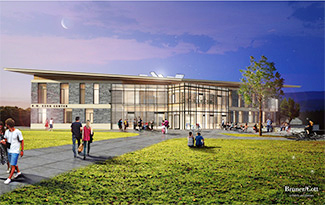 AMHERST, Mass. — A groundbreaking ceremony will be held Nov. 14 for Hampshire College’s new R.W. Kern Center.
AMHERST, Mass. — A groundbreaking ceremony will be held Nov. 14 for Hampshire College’s new R.W. Kern Center.
Developers — architects Bruner/Cott & Associates of Boston and contractor Wright Builders of Northampton, Mass. — are constructing the facility according to requirements set by the Living Building Challenge, which is touted as the most rigorous environmental design standard in the world. The building will create its own energy and treat its own waste.
The Living Building Challenge is an international green building certification program created in 2006 by the nonprofit International Living Future Institute based in Seattle. The challenge is described by the institute as being more rigorous than other green certification programs such as LEED. It requires a project to meet 20 imperatives within seven performance areas (called Petals): site, water, energy, health, materials, equity and beauty. More than 100 project teams are currently pursuing or have achieved the Living Building Challenge’s goals for sustainability.
The 15,000-square-foot R.W.Kern Center, to be opened in 2016, will be “a physical embodiment of the Hampshire College community’s values, and a teaching tool in and of itself,” President Jonathan Lash said in a statement.
While the goal is to achieve full Living Building Certification, the Living Building Challenge offers Petal Recognition by satisfying the requirements of three or more Petals. Projects also may pursue Net Zero Energy Building Certification.
The R.W. Kern Center will be built according to Living Building standards, including generating all its own energy with renewable resources, capturing and treating all of its water, and taking innovative strides such as sharing resources between buildings and functioning without a dependency on fossil fuel-based transportation.
The two-story building will be constructed of locally sourced materials, with a 100kW photovoltaic array atop the roof, and have triple-glazed windows and rainwater collection systems.
The center will serve as an “educational laboratory” that showcases Hampshire’s commitment to addressing sustainability issues.
“The R. W. Kern Center provides a model for addressing global challenges and a symbol of the positive change possible in how we approach built environments. We deeply appreciate the generosity of the Kern family in making this innovative structure possible,” said Hampshire College President Jonathan Lash in a statement.
The facility will be the natural point of entry into the Hampshire College campus in the future. Road construction was completed over the summer to reroute carbon-emission vehicles toward the sides of campus and away from its center, an area that has been converted into wildflower-filled meadowlands.
The center will also provide new classrooms and meeting spaces, and contain exhibit areas for display of student and faculty work, a bookstore and a café. It will house the admissions office and be the place where prospective students, their families, and other visitors can socialize.

